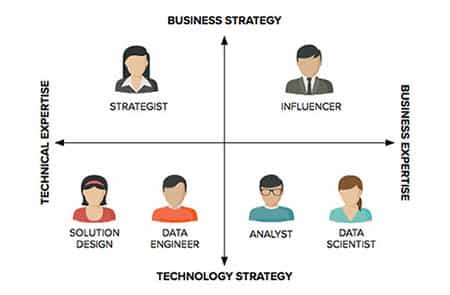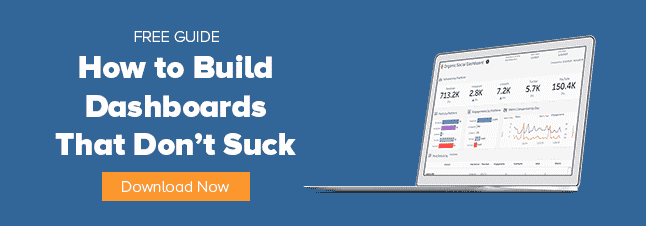
If you want to build a high-performing analytics team, there are six key roles you’ll need to fill — including a data engineer. For more about the six roles, check out this overview.
Want to tackle bigger, more interesting questions with your marketing analytics? And empower your strategists and analysts? Then you need a data engineer on your team.
This is someone who can manage the connections to your sources of marketing data and help configure that data for rapid analysis. By keeping the data flowing, the data engineer makes everybody’s life easier.
How a Data Engineer Can Empower Your Entire Team
At Alight, we’ve found that successful analytics teams tend to have people in six key roles. The data engineer is usually the third role filled, after your strategist and your analyst.

The strategist uses data to make decisions about where and how to reach your desired audience — in many cases, that’s a media buyer. The analyst is responsible for preparing reports and analyzing the data for insights. Both of these roles require fast, reliable access to data.
Marketing analytics software can help. The software will gather results from Google Analytics, Google Ads, Facebook, your email platform and other sources and feed it into a dashboard, giving your team increased visibility into how your campaigns are doing. And it will save them considerable amounts of time in the process.
The problem is that software can only do so much. You’re going to outgrow it eventually.
For example, most analytics software comes with built-in “connectors” to APIs for sources like Facebook Ads and Google Ads. Fill out a few fields, and the data starts flowing. Some of the most popular software comes with huge libraries featuring hundreds of connectors.
Inevitably, though, there’s always one source that your software can’t connect to easily. In some cases, that source could be essential, like the media-buying platform you use in all your campaigns.
That’s where the data engineer comes in. They can find other ways to get the necessary data into your analytics tool, whether that’s through a direct upload or an automated process involving FTP or email.
Data Engineers Do What Software Can’t
You also need a data engineer because most analytics software either struggles to — or simply can’t — unify data. That is, the platforms won’t be able to automatically bring together data from different sources into a common dataset with common KPIs and dimensions.
As your level of insight increases, you’re going to need that ability. It won’t be enough to see one report on Facebook and a separate one on Google Ads. If you’re running paid social and paid search, you’ll want to see total impressions for all your data sources in one spot. A data engineer can help you match up like metrics across sources to build that holistic view.
Another reason to hire a data engineer? Marketing data is notoriously finicky. An API will unexpectedly go on the fritz and stop sending you data. Or you’ll wake up one morning, only to find that Facebook has unleashed a surprise change in how it reports data. Your data engineer can quickly, calmly put things back on track.
Don’t Make Your Marketing Analyst Moonlight as a Data Engineer
You might be asking yourself: Do I really need to hire someone else? Can’t I just make my analyst do all this?
Technically, you can, if you’re OK with your reporting slowing to a crawl anytime your analyst has to go off and play data engineer and assuming they possess the necessary technical skills. This “management strategy” is a great way to encourage your analyst to seek employment elsewhere.
Analytics teams are more successful when each person only fills one role on the team. Your strategist shouldn’t try to be an analyst in their spare time. Your analyst shouldn’t moonlight as a data scientist. Having a dedicated data engineer allows everyone to focus on their job.
If you’re not ready to hire a data engineer full-time, you can outsource or partner with a company that specializes in that sort of work. That’s the model we use at Alight. Our turnkey Analytics-as-a-Service solutions can help fill gaps in your team’s capacity or expertise, including data engineering support.
But don’t look at your data engineer as just another expense. Adding this role is a force multiplier for your insights, and one of the most important milestones in your analytics program. It’s a signal that you’re ready to tackle more challenging and more valuable questions.
Are Alight’s Analytics-as-a-Service Solutions for You?
Alight’s Analytics-as-a-Service model combines an award-winning analytics platform with analytics experts, enabling you to generate powerful insights and reporting. Schedule a demo today!

